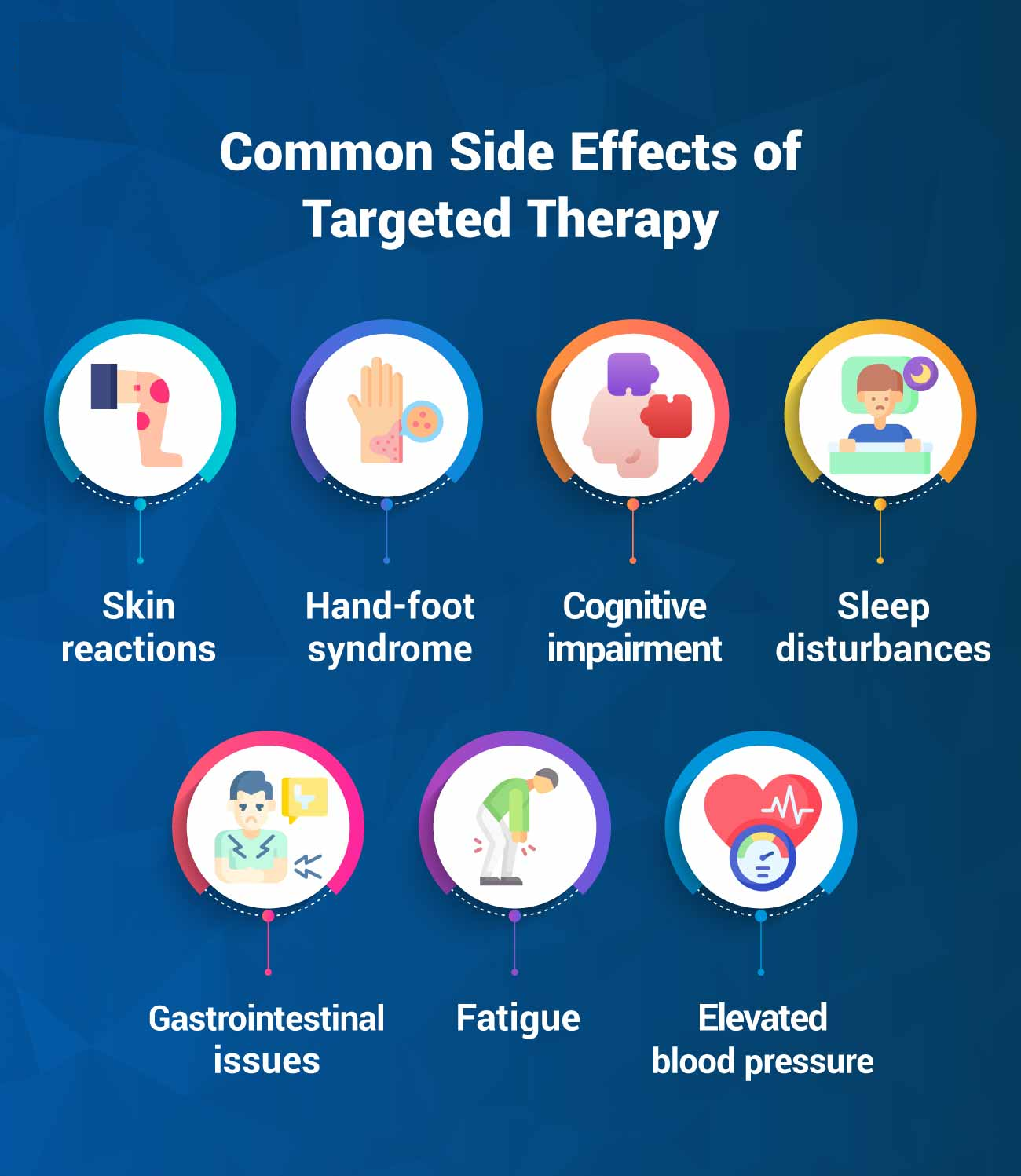What is targeted therapy?
Targeted therapy is cancer treatment that targets the genetic changes or mutations that turn healthy cells into cancer cells. Targeted therapy helps healthcare providers treat cancer cells without hurting healthy cells. Healthcare providers sometimes use targeted therapy as the front line or initial treatment. They may also combine targeted therapy with other treatments.
How does targeted therapy work?
Once healthcare providers understand the genetic mutation changing a healthy cell into a cancer cell, they identify specific cancer cell parts to target for treatment. Sometimes, these are targets on cancer cells surfaces. Other times, the targets are substances inside cancer cells. Here’s information on the two most common kinds of targeted therapies and how they tackle cancer:
Monoclonal antibodies: Monoclonal antibodies are lab-made versions of your antibodies. Your antibodies are part of your immune system. They’re proteins that scour your body for signs of intruder proteins (antigens) that can come from things like infections or cancer cells. Antibodies target these antigens to get rid of the intruders. Monoclonal antibodies have several ways of attacking cancer cells.
Small-molecule drugs:These drugs bind or attach to specific targets on cancer cells, preventing cancer cell growth or killing the cancer cells.
What are examples of targeted therapies?
Cancer cells need many things to survive. Some targeted therapies designed to keep cancer cells from growing, multiplying, and surviving include:
-
Angiogenesis inhibitors: Just like all organs and tissues, cancer cells have blood vessels that they rely on for the oxygen and nutrients to survive. To make sure they get enough oxygen and nutrients, cancer cells send out chemical signals encouraging their blood vessels to keep on growing. Angiogenesis inhibitors block these signals — and cancer cells’ lifeblood.
-
Proteasome inhibitors: This targeted therapy focuses on enzymes called proteasomes. These enzymes digest proteins located in cancer cells.
-
Signal transduction inhibitors: This treatment disrupts the cancer cells’ messaging system for growth and survival. Normally, cancer cells use a protein receptor called a signaling receptor to send messages to other proteins inside the cell. These proteins rely on the signaling receptor for instructions on dividing, dying, and other steps cancer cells take to grow and multiply.
Can targeted therapies treat all kinds of cancer?
Healthcare providers have developed more than 80 targeted therapies to treat many kinds of cancer. Further, they’ve developed targeted therapies that treat different mutations that are part of the same kind of cancer. Some types of cancer that may be treated with targeted therapy include:
- Blood cancers like leukemia, multiple myeloma, and lymphoma.
- Brain cancers like glioblastoma and neuroblastoma (treated with monoclonal antibodies acting as immunotherapy).
- Bone and soft tissue cancers like certain soft tissue sarcomas.
- Breast cancers like BRCA gene mutation breast cancer, HER2-positive breast cancer, hormone receptor-positive breast cancer, and triple-negative breast cancer.
- Digestive system cancers like colorectal (colon) cancer, esophageal cancer, gastrointestinal stromal tumor (GIST), neuroendocrine tumors, non-Hodgkin’s lymphoma, pancreatic cancer, stomach cancer (intestinal stomach adenocarcinomas), hepatocellular (liver) cancer, and cholangiocarcinoma (gall bladder cancer).
- Head and neck cancers like laryngeal cancer, nasal cavity and paranasal sinus cancer, nasopharyngeal cancer, oral cancer, and oropharyngeal cancer.
- Lung cancers like non-small cell lung cancer, small cell lung cancer, and mesothelioma.
- Reproductive system cancers like cervical cancer, endometrial cancer (high risk or cancer that’s come back), and prostate cancer.
- Skin cancers like melanoma and cutaneous squamous cell skin cancer.
- Thyroid cancers like anaplastic thyroid cancer, medullary thyroid cancer, and papillary/follicular thyroid cancer.
- Urinary system cancers like bladder cancer, kidney cancer, and prostate cancer.
Is targeted therapy always successful?
Targeted therapy is a very effective treatment, but it isn’t always successful. Identifying a target for therapy is a complicated process that requires healthcare providers to obtain very detailed information about a cancer. It’s a challenging process, and healthcare providers are still learning how to make this more successful. Here are some examples of why targeted therapy might not work:
- The tumor doesn’t have the target that matches the treatment.
- The tumor doesn’t react to the therapy as expected. For example, some targeted therapies concentrate on blocking tumor growth with a drug tailored to the substance driving growth. But if it turns out the tumor doesn’t need that substance to grow, the targeted therapy won’t make a difference.
- The tumor cells continue to mutate. When that happens, the targeted therapy stops working or isn’t as effective as it once was.
